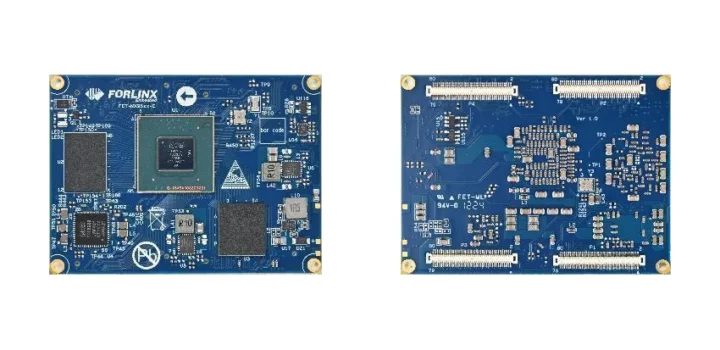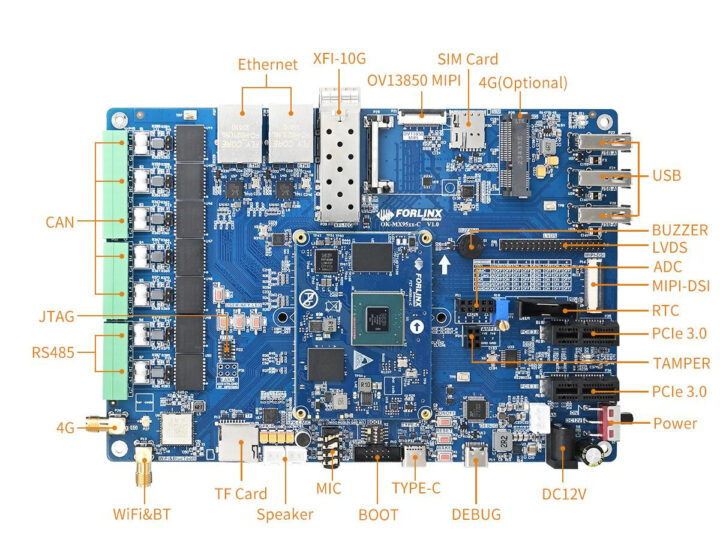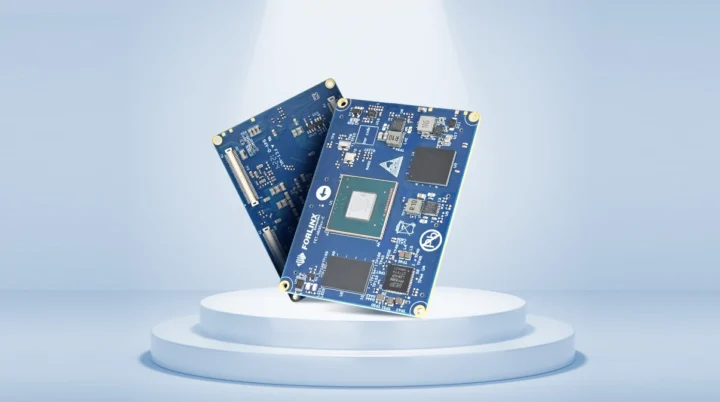Forlinx FET-MX95xx-C is a system-on-module (SoM) based on NXP i.MX 95 SoC with up to six Cortex-A55 cores, an Arm Cortex-M7 real-time core clocked at 800 MHz, an Arm Cortex-M33 “safety” core clocked at 333 MHz, and equipped with 8GB LPDDR4x and 64GB eMMC flash.
The company also provides the feature-rich OK-MX95xx-C development board based on the i.MX 95 module with a wide range of interfaces such as dual GbE, a 10GbE SFP+ cage, terminal blocks with RS485 and CAN Bus interface, three USB Type-A ports, two PCIe slots, and more.
Forlinx FET-MX95xx-C system-on-module
Specifications:
- SoC – NXP i.MX 9596
- CPU
- 6x Arm Cortex-A55 application cores clocked at 1.8 GHz (industrial) with 32K I-cache and D-cache, 64KB L2 cache, and 512KB L3 cache
- Arm Cortex-M7 real-time core clocked at 800 MHz
- Arm Cortex-M33 safety core clocked at 333 MHz
- GPU – Arm Mali-G310 V2 GPU for 2D/3D acceleration with support for OpenGL ES 3.2, Vulkan 1.2, OpenCL 3.0
- VPU
- 4Kp30 H.265 and H.264 encode and decode
- JPEG Encoder, JPEG Decoder
- AI Accelerator – NXP eIQ Neutron 2 TOPS neural processing unit (NPU) with 750 inf/sec
- CPU
- System Memory – 8GB LPDDR4X
- Storage – 64GB eMMC flash
- Networking
- 2x GbE controllers with TSN support
- Optional M.2 1216 WiFi 6 and Bluetooth 5.3 (on module)
- 4x 80-pin board-to-board connectors
- Storage – SD Card 3.0
- Display interfaces
- 2x 4-lane or 1x 8-lane LVDS up to 1080p60
- 4-lane MIPI DSI up to 4Kp30 or 3840×1440 @ 60 Hz
- Camera – Up to 2x MIPI CSI-2
- Audio – Up to 5x SAI, 8-channel microphone input, 1x S/PDIF
- Networking
- Up to 2x Gigabit Ethernet with Time Sensitive Networking (TSN)
- 1x 10 Gbps Ethernet supporting XFI, SGMII (2.5 G and 1G), and 10 G-USXGMII (10GE), TSN
- USB
- 1x USB 2.0 Host/Device
- 1x USB 3.0 Host/Device
- Serial – Up to 8x UART up to 5 Mbps
- Analog – Up to 8x 12-bit ADC up to 1Msps
- PCIe – 2x PCIe Gen3
- Other peripheral interfaces
- SDIO 3.0
- Up to 5x CAN FD, CAN 2.0B
- Up to 7x I2C, 8x SPI, 1x XSPI, 6x PWM
- Up to 111x GPIO
- Security
- NXP EdgeLock 2GO key management services
- Cryptographic Acceleration and Assurance Module
- Resource Domain Controller
- Arm TrustZone
- High Assurance Boot support
Encryption Engine – AES-128, AES-256, 3DES, RC4, RSA4096, TRNG, SHA-1, SHA-2, SHA-256, MD-5 - RSA-1024, 2048, 3072, 4096, and secure key storage
- Side-channel attack resistance
- Debugging – 4-pin JTAG debug interface
- Dimensions – 68 x 50 mm
- Temperature Range – -40°C to 85°C
 Only Linux is supported, and the company says its module targets the automotive, industrial, and commercial IoT markets.
Only Linux is supported, and the company says its module targets the automotive, industrial, and commercial IoT markets.
Forlinx OK-MX95xx-C development board
 The OK-MX95xx-C development board makes full use of most of the I/Os provided by the NXP i.MX 95 module.
The OK-MX95xx-C development board makes full use of most of the I/Os provided by the NXP i.MX 95 module.
Specifications:
- Supported SoM – Forlinx FET-MX95xx-C as described above
- Storage
- MicroSD card slot (SD 3.0, 4-bit)
- 4-bit QSPI FLASH
- Display Interface
- Dual 8-bit LVDS up to 1080p60
- 4-lane MIPI DSI up to 4Kp30 or 3840×1440 @ 60Hz
- Camera Interface – MIPI CSI connector for OV13850 camera
- Audio
- 4-stage headphone socket with built-in HP and MIC
- On-board electret MIC
- Dual-channel speaker connectors
- Active buzzer
- Networking
- 10Gbps Ethernet SFP cage (XFI)
- 2x Gigabit Ethernet RJ45 ports
- Dual-band WiFi 5 and Bluetooth 5 via SMA antenna connector and AzureWave AW-CM358SM module connected over:
- SDIO for WiFi
- UART for Bluetooth
- I2S for audio
- Optional 4G LTE via Quectel EC20/ EC25 mini PCIe module and SMA antenna connector
- USB
- 3x USB 2.0 host ports via hub
- 1x USB Type-C OTG port
- Serial
- Terminal blocks for 5x CAN FD with isolated circuit, support for CAN 2.0B up to 5 Mbps
- Terminal block for 2x RS485 with auto transceiving control, with isolated circuit
- Expansion
- 2x PCIe 3.0 x1 slots supporting both RC and EP
- Mini PCIe socket
- 8x ADC (1.8V) via 10-pin header and potentiometer
- Debugging
- USB Type-C port connected to UART1/2/3 for Cortex-A55/M33/M7 debugging
- JTAG connector
- Misc
- RTC and CR2032 battery
- 7x buttons: Reset, Sleeping mode, power switch, and 4 user-defined keys
- 4x user-defined LEDs
- Fan connector for cooling
- Tamper detection header
- 10-pin BOOT connector
- Power Supply – 12V DC via power barrel jack
- Dimensions – TBD
As usual, Forlinx does not provide any public documentation for its modules and development boards, and instead will only provide the following resources to customers:
- Hardware related: datasheet, user guide, carrier board schematic, carrier board PCB, SoM pinmux
- Firmware related: OS image, testing demo, source code, user manual
- Compiling environment
The Forlinx FET-MX95xx-C is not the first NXP i.MX 95 system-on-module with 10GbE we’ve covered, but after the Variscite DART-MX95, it’s the second relying on board-to-board connectors, while most other models rely on a 314-pin MXM 3.0 connector as part of the SMARC 2.1 standard (ADLINK LEC-IMX95, iWave iW-RainboW-G61M, and conga-SMX95) or a SO-DIMM edge connector like the Toradex Verdin iMX95 module. As a side note, Toradex is also working on a B2B NXP i.MX 95 module with the Aquila iMX95 scheduled for Q1 2025.
Pricing information is not made public either, and you’d have to contact the company through the product page to get a quote. The company also has an Alibaba store, but currently, its NXP i.MX 95 module and development board are not listed there.

Jean-Luc started CNX Software in 2010 as a part-time endeavor, before quitting his job as a software engineering manager, and starting to write daily news, and reviews full time later in 2011.
Support CNX Software! Donate via cryptocurrencies, become a Patron on Patreon, or purchase goods on Amazon or Aliexpress





